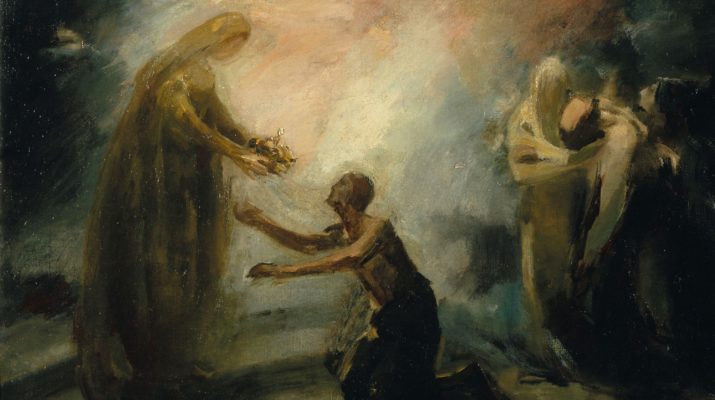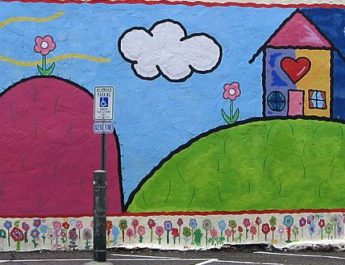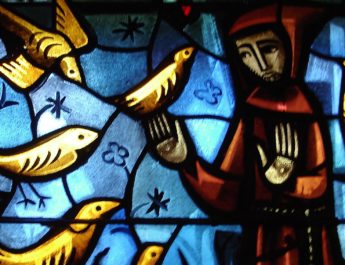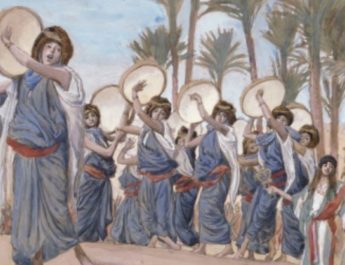Isaiah 58:9b-14
Ordinary C39
9 Then you shall call,A and the LordB will answer;C
you shall cry for help,D and he will say, “HereE I am.”
A “call” = qara. This is to call or call out – to call someone by name. Also used more broadly for calling forth.
B “Lord” = YHVH. From havah (to be, become) or hayah (to come to pass, become, be). This is the name of the God of Israel, the self-existent and eternal one, the tetragrammaton. This pronunciation has been lost to time so “Lord” is generally used in its place.
C “answer” = anah. This is answer, respond, announce, sing, shout, or testify. It means to pay attention, which implies responding and, by extension, starting to talk. Used in a specific sense for singing, shouting, testifying, etc.
D “cry for help” = shava. This is crying or shouting aloud, generally seeking freedom from some kind of trouble.
E “here” = hen. This is a remark of surprise or excitement: lo! Behold! It can also mean if or though.
If you removeF the yokeG from amongH you,
F “remove” = sur. This is to turn aside in a literal or figurative sense – to depart, decline, rebel, remove, or withdraw.
G “yoke” = motah. 12x in OT. From mot (pole, bar of a yoke, bar used for carrying; a pole that shakes and so this also has the sense of wavering or falling); from mot (to shake, slip, falter, stagger, move, give way, be carried). This is a pole, bar, yoke, or staves. Properly, a pole, but by implication a yoke in a literal or figurative sense.
H “among” = tavek. This is among, middle, in the midst, the center. Perhaps, properly, to sever.
the pointingI of the finger,J the speakingK of evil,L
I “pointing” = shalach. This is to send out, away, send for, forsake. It can also mean to divorce or set a slave free.
J “finger” = etsba. Perhaps from the same as tseba (dye, something dipped). This is finger or toe – something used to seize.
K “speaking” = dabar. This is generally to speak, answer, declare, or command. It might mean to arrange and so to speak in a figurative sense as arranging words.
L “evil” = aven. Root may mean panting as one does when expending a lot of energy, especially when it comes to nothing. This is nothingness, trouble, sorrow, distress, wickedness, evil, harm, sorrow, misfortune, and mischief. It is also used specifically to refer to idols.
10 if you offerM your food to the hungryN
and satisfyO the needs of the afflicted,P
M “offer” = puq. 7x in OT. This is to supply, obtain, offer, give, secure, succeed.
N “hungry” = raeb + nephesh. Raeb is 16x in OT. From raeb (to be hungry or famished). This is hungry, a person who is hungry. Nephesh is related to naphash (to refresh or be refreshed). This is soul, self, person, emotion. It is a breathing creature. Can also refer to appetites and desires.
O “satisfy” = saba. To be satisfied or full in a literal or figurative sense. Also, to have plenty of.
P “afflicted” = nephesh + anah. Nephesh is the same as “hungry” in v10. See note N above. Anah is to be bowed down. It can refer to a sense of humility or to a sense of being browbeaten, oppressed, afflicted, or depressed. This can be literal or figurative – depressed in mood or circumstance.
then your lightQ shall riseR in the darknessS
and your gloomT be like the noonday.U
Q “light” = or. From or (to be or become light). This is light, sun, sunshine, dawn, or daylight. Figuratively, it can refer to light from instruction, light of a face (that is to say one that is cheerful or finds favor). It can refer to prosperity or salvation; a light that guides, a light eternal from Zion.
R “rise” = zarach. 18x in OT. This is to rise, shine, or dawn. It can also be used to describe symptoms of leprosy.
S “darkness” = choshek. From chashak (to be or become dark). This is literal darkness is contrast to light. Figuratively, it can be obscurity, sorrow, misery, blindness, wickedness, destruction, death. It can also be hiding places. Additionally, it can mean judgment, mourning, ignorance, evil, or sin.
T “gloom” = aphelah. 10x in OT. From the same as ophel (darkness, gloom, dusk, obscurity); from the same as aphel (gloomy – unused root which refers to the sun setting i.e. dusky, dark). This is darkness, gloominess, calamity, or an adjective to emphasize how thick darkness is. It is also used to mean misfortune or hiding something.
U “noonday” = tsohar. From tsahar (pressing oil, glistening); from yitshar (fresh oil, anointed; oil as that which is burned to make light; used figuratively to talk about anointing). This is a light, window, or midday.
11 The LordV will guideW you continuallyX
and satisfy your needsY in parched placesZ
V “Lord” = YHVH. Related to “Lord” in v9. See note B above. It has a different vowel pointing, but the same meaning.
W “guide” = nachah. This is lead, guide, or bring. It can be used for transporting into exile or coming in as colonists. This is the word used in Psalm 23 “he leads me in the paths of righteousness.”
X “continually” = tamid. May come from a word that means to stretch. This word means an indefinite period of time. So, it could be regular or daily. It could also be constantly, continually, always, or perpetually.
Y “needs” = nephesh. Same as “hungry” in v10. See note N above.
Z “parched places” = tsachtsachah. 1x in OT. From tsachach (to dazzle, glare; to be bright). This is a place that is scorched or dry like a desert.
and make your bonesAA strong,BB
and you shall beCC like a wateredDD garden,EE
AA “bones” = etsem. From atsam (vast, numerous, strong; to close one’s eyes, to make powerful; to break bones). This is self, life, strength, bone, or substance.
BB “make…strong” = chalats. This is to pull off, withdraw, arm, loose, depart, deliver, prepare for a battle, strengthen.
CC “be” = hayah. Related to “Lord” in v9 & “Lord” in v11. See note B above.
DD “watered” = raveh. 3x in OT. From ravah (to have one’s thirst or cravings satisfied; to soak, water, or satisfy). This is watered or drunken.
EE “garden” = gan. From ganan (to put a hedge around – generally, protect or defend; to cover or surround). This is a garden in that it is fenced in. It can also be an enclosure.
like a springFF of waterGG
whose waters never fail.HH
12 Your ancientII ruinsJJ shall be rebuilt;KK
FF “spring” = motsa. From yatsa (to go or come out, bring forth, appear; to go out in a literal or figurative sense). This is going forth as an act or the site from which something goes forth. It could mean exiting a place or the place where one exits. It can also be a source or a produce. Specifically, it can be a spring or fountain, the dawn as the the rising of the sin, an export, gate mine, and so on.
GG “water” = mayim. This is water, waters, or waterway in a general sense. Figuratively, it can also mean juice, urine, or semen.
HH “fail” = kazab. 18x in OT. This is to lie, be false or in vain, to fail. It is to deceive in a literal or figurative sense.
II “ancient” = olam. This is a long scope of time whether in the past (antiquity, ancient time) or in the future (eternal, everlasting).
JJ “ruins” = chorbah. From chareb (to be waste or desolate, destroyer). This is ruin, desert, waste place. Properly, it is a drought, which implies a desolated or decayed place.
KK “rebuilt” = banah. This is to build, make, set up, restore, repair, or obtain children. It is to build literally or figuratively.
you shall raise upLL the foundationsMM of many generations;NN
LL “raise up” = qum. To arise, stand, accomplish, establish, abide. This is rising as in rising against, getting up after being sick or asleep, arising from one state to another, becoming powerful, or rising for action. It can also be standing in a figurative sense.
MM “foundations” = mosadah. 11x in OT. From mosad (foundation); from yasad (to establish, appoint, instruct; to set in a literal or figurative sense; also, to sit down together and so to consult or take counsel). This is a foundation.
NN “generations” = dor + dor. From dur (to move in a circle, which implies living somewhere or remaining there; it can also be the sense of piling or heaping up). This is a revolution of time, which is to say, an age or generation. It can also be a dwelling or one’s posterity.
you shall be called the repairerOO of the breach,PP
the restorerQQ of streetsRR to liveSS in.
OO “repairer” = gadar. 10x in OT. To build a wall or wall off, mason, repair, hedge, enclose. This is to wall in or wall around.
PP “breach” = perets. 19x in OT. From parats (to make a breach, burst out, compel, disperse; to break out literally or figuratively). This is a breach or a gap. It could be a break, whether literal or figurative.
QQ “restorer” = shub. To turn back, return, turn away – literally or figuratively. Doesn’t necessarily imply going back to where you started from. This is also the root verb for the Hebrew word for repentance “teshubah.”
RR “streets” = nathiyb. Root may mean to tramp. This is a path beaten from regular use. So, it is pathway or traveler.
SS “live” = yashab. This is to sit and so to remain and so to dwell. It is sitting for any reason – as a judge, in order to ambush, or just sitting quietly. Causatively, this can mean settling or marrying. This can also mean continue, endure, or establish.
13 If you refrainTT from tramplingUU the Sabbath,VV
TT “refrain” = shub. Same as “restorer” in v12. See note QQ above.
UU “trampling” = regel. This is foot, endurance, or journey. It is a foot as the means of walking and so it implies a step or a greater journey. It can be used euphemistically for private parts.
VV “Sabbath” = shabbat. From shabath (to rest, stop, repose, cease working; by implication, to celebrate). This is sabbath, literally meaning rest or intermission.
from pursuingWW your own interestsXX on my holyYY day;ZZ
WW “pursuing” = asah. This is to make, do, act, appoint, become in many senses.
XX “interests” = chephets. From chaphets (properly, inclined towards or bending to; figuratively, to desire, delight in, or be pleased with). This is a delight, care, or pleasure. It is what you desire or what is acceptable. It can also be used concretely for a precious thing or something that one is thinking about.
YY “holy” = qodesh. This is set apart and so sacred. God is different from us and so God is holy/set apart. Things we dedicate to God’s service are set apart for God and so they, too, are holy, etc.
ZZ “day” = yom. Root may mean being hot. This is the day in a literal or figurative sense. It can also mean birth, age, daylight, continually or other references to time.
if you call the Sabbath a delightAAA
and the holyBBB day of the LordCCC honorable;DDD
AAA “delight” = oneg. 2x in OT. From anog (soft or delicate; figuratively, luxurious or effeminate; a dainty, delight, or joke). This is pleasant, delight, luxury.
BBB “holy” = qadosh. Related to “holy” in v13. From qodesh (see note YY above). This is sacred or holy in a ritual or moral sense. As a noun, it refers to a holy one (like a saint or angel), a holy place (the sanctuary), or God (the Holy One).
CCC “Lord” = YHVH. Same as “Lord” in v9. See note B above.
DDD “honorable” = kabad. To be heavy, weighty, or severe. It can also be positive abounding in, rich, or honorable. The Hebrew word for “glory,” kabod, is taken from this root.
if you honorEEE it, not goingFFF your own ways,GGG
servingHHH your own interests or pursuingIII your own affairs;JJJ
EEE “honor” = kabad. Same as “honorable” in v13. See note DDD above.
FFF “going” = asah. Same as “pursuing” in v13. See note WW above.
GGG “ways” = derek. From darak (to tread, march, to walk. Can also mean affixing a string to a box since one needs to step on it to bend it in the process; so also an archer). This is a road as a thing that is walked on. Can be used figuratively for the path that one’s life takes or how one chooses to live one’s life.
HHH “serving” = matsa. This is to find, catch or acquire. It can also mean to come forth or appear. Figuratively, this can mean to meet or be together with.
III “pursuing” = dabar. Same as “speaking” in v9. See note K above.
JJJ “affairs” = dabar. Related to “speaking” in v9. From dabar (see note K above). This is speech, a word, a matter, an affair, charge, command, message, promise, purpose, report, request. It is a word, which implies things that are spoken of in a wide sense.
14 then you shall take delightKKK in the Lord,LLL
and I will make you rideMMM upon the heights of the earth;NNN
KKK “take delight” = anog. Related to “delight” in v13. 10x in OT. See note AAA above.
LLL “Lord” = YHVH. Same as “Lord” in v9. See note above. See note B above.
MMM “ride” = rakab. This is to ride an animal or in some vehicle. It can also mean bringing on a horse.
NNN “earth” = erets. Root may mean to be firm. This is earth, ground, field land, or country.
I will feedOOO you with the heritagePPP of your ancestorQQQ Jacob,RRR
for the mouthSSS of the LordTTT has spoken.
OOO “feed” = akal. This is to eat, devour, burn up, or otherwise consume. It can be eating in a literal or figurative sense.
PPP “heritage” = nachalah. Related to nachal (to inherit, occupy, distribute, take as heritage). This is properly something that was inherited. It can mean occupancy generally or, more particularly, an heirloom or an estate. This can be an inheritance, gift, possession, or portion.
QQQ “ancestor” = ab. This is father, chief, or ancestor. It is father in a literal or figurative sense.
RRR “Jacob” = Yaaqob. From the same as aqeb (heel, hind part, hoof, rear guard of an army, one who lies in wait, usurper). This is Isaac’s son and his descendants. The name means heel-catcher or supplanter.
SSS “mouth” = peh. This is mouth in a literal or figurative sense. So, more literally, it can be beak or jaws. More figuratively, it refers to speech, commands, or promises.
TTT “Lord” = YHVH. Same as “Lord” in v9. See note above. See note B above.
Image credit: “Praying” by Alex Clapes Puig, 1890-1895. Photo by Asar Studios, 2015.




